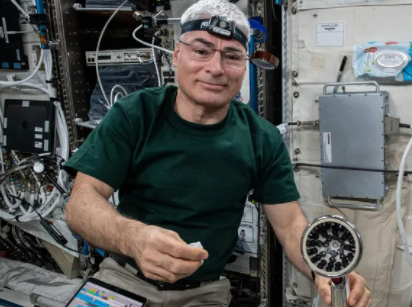Russia says it will not trap US astronauts in space, despite media reports
Russia says it will not trap US astronauts in space, despite media reports
Last week, a flurry of news reports worryingly claimed that Russia was threatening to trap a US astronaut on the International Space Station in direct response to sanctions imposed on the country as it continues to invade neighboring Ukraine. But Russia's state space corporation Roscosmos is trying to allay those fears, saying it will bring astronauts home as planned.
The NASA astronaut in question is Mark Vande, who has been living on the International Space Station since April 2021. Vande He was launched to the ISS from Kazakhstan on a Russian Soyuz rocket with two astronauts. While aboard the ISS, her stay was extended for a full year, and she is expected to return home in another Soyuz capsule on March 30. When he returns home, he will hold the record for the longest sustained spaceflight by an American astronaut. About 353 days.
There are fears that Russia may actually refuse to bring Vande Hei home on the Soyuz, which aired last week. The source of the confusion came from a video shared by Russian state news program RIA Novosti on March 5, which showed footage of Vande Hei with her fellow Russian astronauts on the ISS. The clip was cut together in such a way that it looked like the Russians would overtake him and then completely tear apart the Russian part of the ISS.
However, the seriousness of this "threat" was always in doubt. Roscosmos head Dmitry Rogozin shared the video on his Telegram channel with a message from RIA Novosti, implying that it was a joke. "The Roscosmos television studio jokingly demonstrated the possibility of Russia withdrawing from the ISS project - the undocking of the Russian section of the station, without which the American part of the project could not exist," the caption read.
But several US news reports took the video quite seriously. Good Morning America and Fox News ran stories claiming that Russia was threatening to leave Vande Hey behind, along with several other outlets. Now, Russia is denying those claims in a new story from TASS, one of the country's state-run media outlets.
According to TASS, Roscosmos said in a statement, "American cosmonaut Mark Vande Hei will return home with Russia's Anton Shkaplerov and Pyotr Dubrov on March 30 in the Soyuz MS-19 spacecraft." Vande Hei and the rest of his crew prepare to land in Kazakhstan, as has been the landing destination for all previous Soyuz landings. Meanwhile, NASA has also said that both the US space agency and Roscosmos continue to work together on the International Space Station and that operations continue as normal.
Roscosmos tried to quell the uproar, refuting Vande Hei's claims in the TASS report. "Roscosmos has never let anyone doubt its credibility as a partner," said the corporation's press service.
To be fair, it is becoming a challenge for Roscosmos' partners to take "joke" space reports from the Russian media and Dmitry Rogozin seriously. Rogozin has been tweeting various angry statements and memes on Twitter over the past few weeks in response to the United States and Europe approving Russia's invasion of Ukraine. They range from threatening threats - like when he shot the idea of the ISS crashing over America without Russia's help - to ridiculous videos - like one of the Tom and Jerry cartoons called "Ukraine". with characters. Russia," and "NATO."
Rogozin is the head of Russia's space program, and the things he says online sometimes turn into actual policy. For example, Rogozin tweeted a video of himself on March 2, in which he issues a series of conditional demands to Roscosmos customer OneWeb. Roscosmos was supposed to launch a new batch of satellites for OneWeb on a Russian Soyuz rocket from Kazakhstan on March 5, but Rogozin said Russia would not proceed with the launch until the company promised that the satellites would be used for military purposes. will be done for And the UK government sold its entire stake in OneWeb. The company did not accede to the demands, and as a result, Roscosmos withdrew the Soyuz from the launchpad. The launch never happened.







No comments